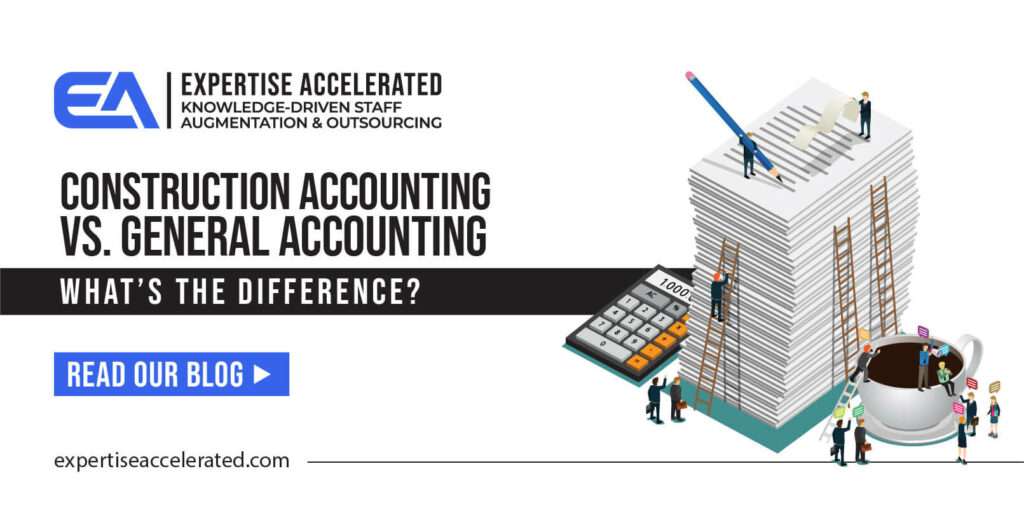Construction Accounting: A Guide to Properly Managing Costs and Financials
Construction Accounting: A Guide to Properly Managing Costs and Financials
Blog Article
Recognizing the Relevance of Building Accountancy for Effective Project Management

Function of Building Audit
Construction accounting works as the foundation of economic management in the construction market, making certain that tasks are finished within spending plan and financial objectives are satisfied. construction accounting. This specific bookkeeping technique addresses the one-of-a-kind obstacles encountered in construction jobs, including differing task durations, fluctuating expenses, and several stakeholders
Among the primary roles of building and construction accounting is to provide accurate price estimate and tracking throughout the job lifecycle. This assists in educated decision-making, allowing project supervisors to change timelines and sources effectively. Additionally, building and construction audit improves money flow management by keeping track of accounts receivable and payable, hence making certain that funds are readily available for timely payments to subcontractors and suppliers.
It gears up job supervisors with the needed economic data to prepare comprehensive economic statements, which are crucial for audits and monetary reviews. Inevitably, the role of building and construction accounting expands past plain financial tracking; it is integral to tactical preparation and functional efficiency, driving the success of building projects in a competitive landscape.
Key Elements of Construction Bookkeeping

Budgeting establishes an economic framework that guides job execution, permitting managers to assign resources successfully and expect potential economic obstacles. Precise cost monitoring is necessary for tracking expenses in real-time, aiding to identify differences in between forecasted and actual expenses. This enables prompt adjustments to maintain the job on spending plan.
Moreover, monetary coverage offers stakeholders with a clear picture of the task's financial health and wellness. Normal records, such as revenue and loss statements and capital evaluations, promote educated decision-making and boost openness amongst all celebrations involved.
In addition, compliance with sector guidelines and bookkeeping criteria is important. This makes certain that monetary practices are not only reliable but additionally legal, guarding the organization against legal consequences. By incorporating these essential elements, building accounting promotes an organized method to taking care of economic resources, eventually adding to the effective conclusion of construction jobs.
Advantages for Task Supervisors
Leveraging effective building bookkeeping methods supplies task supervisors with a multitude of benefits that improve both operational efficiency and financial oversight. One substantial advantage is boosted spending plan monitoring. Accurate tracking of revenues and expenditures allows task supervisors to keep an eye on monetary efficiency in actual time, making certain jobs stay within budget and helping with prompt changes when needed.
In addition, building and construction audit simplifies capital administration, enabling task managers to maximize and prepare for economic requirements source appropriation. By comprehending cash money inflows and discharges, they can better take care of repayments to distributors, subcontractors, and workers, consequently avoiding expensive hold-ups.
Additionally, durable bookkeeping systems provide extensive coverage capacities. Job supervisors can produce reports that provide understandings into project productivity, cost differences, and source usage. This data-driven approach cultivates notified decision-making, permitting managers to identify possible concerns proactively and implement restorative steps.
Lastly, adherence to building audit standards guarantees compliance with regulatory and legal requirements, minimizing the threat of penalties or conflicts. In general, efficient building bookkeeping equips project managers with the tools needed to drive project success, improve stakeholder self-confidence, and advertise long-lasting organizational growth.
Typical Difficulties in Building Accountancy
Many project managers encounter substantial challenges in construction accounting that can hinder job success. Among the main difficulties is the complexity of tracking several work sites, each with distinctive spending plans, timelines, and source allowances. This calls for thorough interest to detail, which can be overwhelming without a durable audit system in area.
In addition, rising and fall product expenses and labor rates can make complex budget plan monitoring, making exact projecting challenging. Project supervisors commonly battle to resolve these costs with real expenditures, resulting in potential economic inconsistencies.
Moreover, building accountancy involves conformity with different policies, including tax obligation responsibilities and labor laws. Browsing these guidelines can be difficult, particularly for supervisors who might not have a solid accounting history.
Another considerable challenge is taking care of capital, which is important in the building and construction market. Hold-ups in invoicing, repayments from customers, or unforeseen task modifications can create read what he said capital lacks, jeopardizing the job's progression.
Lastly, efficient communication between job supervisors, accounting professionals, and area teams is crucial. Misconceptions can result in imprecise financial reporting, additionally making complex project administration initiatives. Dealing with these obstacles proactively is crucial for successful building audit.

Ideal Practices for Effective Accounting
While browsing the intricacies of building audit can be complicated, taking on ideal methods can dramatically enhance economic monitoring and task success. One essential method is preserving accurate and prompt records. Executing robust audit software program tailored to building projects can simplify information entrance, invoicing, and reporting, reducing mistakes and conserving time.
Additionally, developing a clear budget plan and regular surveillance versus this budget plan are important. Employing a system of routine monetary evaluations allows job managers to determine variations early, helping with prompt decision-making. It is additionally vital to separate project costs right into indirect and direct groups, allowing clearer understandings right into productivity.
One more ideal technique involves promoting open communication amongst all stakeholders. Regular updates and why not look here joint discussions concerning financial status can make certain everybody is straightened and educated. Training team in construction-specific accounting principles additionally enhances competency and accuracy.
Lastly, making sure compliance with appropriate audit standards and laws is non-negotiable. Regular audits and interior testimonials contribute to transparency and liability, building count on with customers and stakeholders. By concentrating on these finest techniques, building and construction firms can enhance their audit processes, ultimately driving job success and monetary security.
Verdict
In final thought, building audit plays a critical function in making sure effective task monitoring by facilitating accurate monetary oversight and improving decision-making. By incorporating crucial elements such as expense estimate, money circulation administration, and compliance, job supervisors can navigate typical difficulties and take advantage of ideal techniques for efficient accountancy. Eventually, a durable building and construction accounting structure not just safeguards spending plan integrity however likewise contributes to the overall economic wellness of building and construction tasks, promoting sustainable success within the industry.
By incorporating these key parts, building and construction accountancy promotes a structured method to managing monetary find out resources, eventually contributing to the successful conclusion of building projects.
Accurate monitoring of costs and incomes enables project supervisors to keep an eye on monetary efficiency in actual time, making sure projects continue to be within budget plan and facilitating prompt modifications when necessary.
Task managers can produce records that offer understandings into task productivity, expense differences, and resource utilization.Numerous project supervisors encounter significant obstacles in construction accountancy that can hinder job success. construction accounting. Ultimately, a durable construction bookkeeping structure not just safeguards spending plan honesty however additionally contributes to the total financial health of building tasks, fostering lasting success within the sector
Report this page